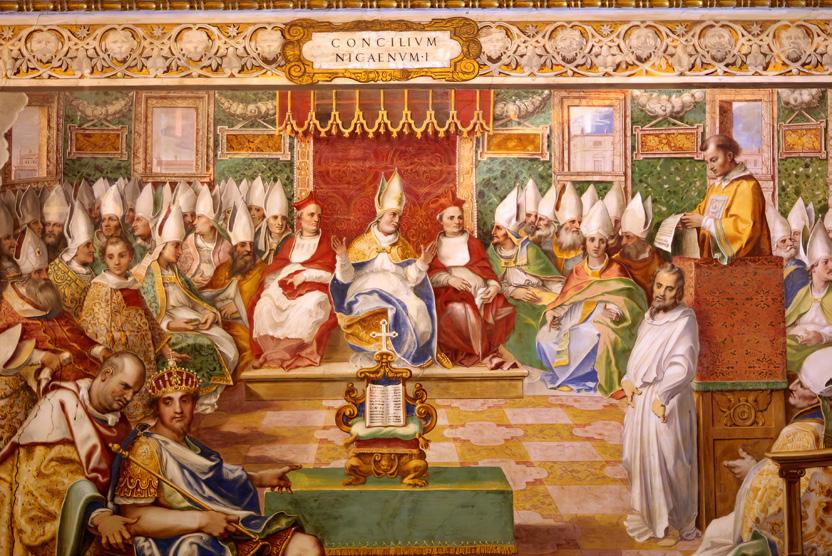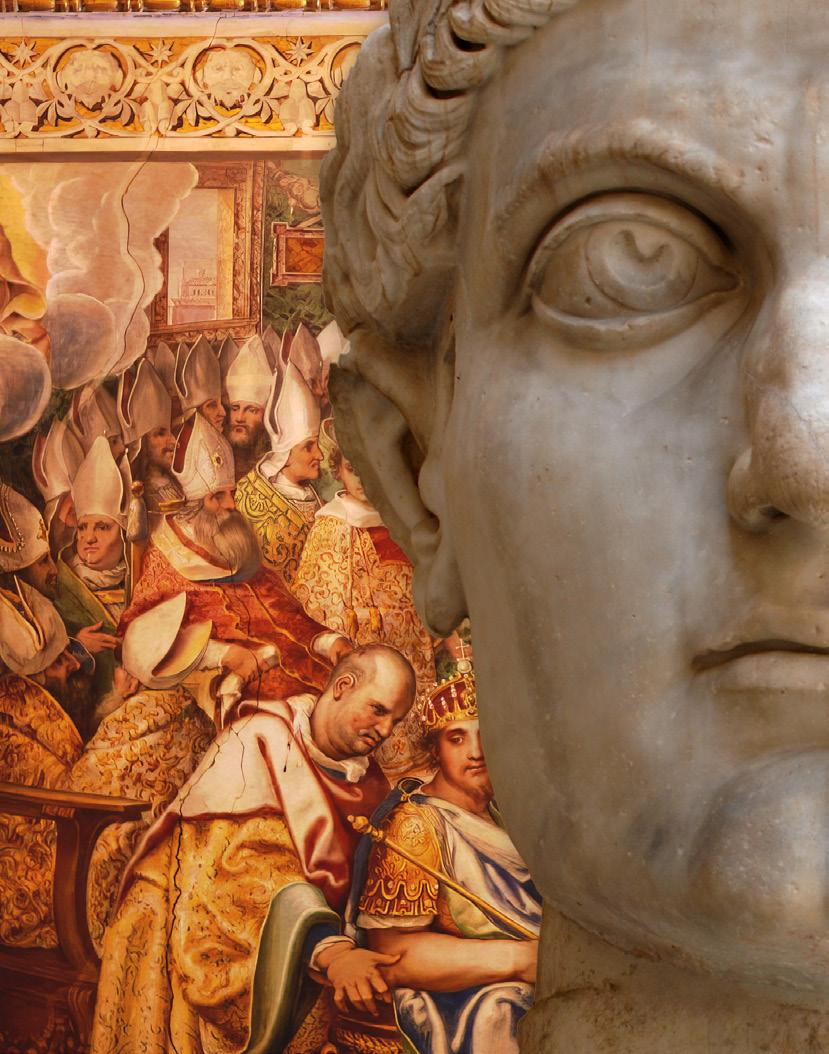A Magazine of



Discern magazine (ISSN 2372-1995 [print]; ISSN 2372-2010 [online]) is published every two months by the Church of God, a Worldwide Association, as a service to readers of its LifeHopeandTruth.com website. Discern’s home page is LifeHopeandTruth.com/Discern. Free electronic subscriptions can be obtained at LifeHopeandTruth.com/ Discern. Contact us at info@DiscernMag.com
Postmaster:
Send address changes to P.O. Box 3490, McKinney, TX 75070-8189
©2025 Church of God, a Worldwide Association, Inc. All rights reserved.
Publisher:
Church of God, a Worldwide Association, Inc., P.O. Box 3490, McKinney, TX 75070-8189; phone 972-521-7777; fax 972-521-7770; info@cogwa.org; LifeHopeandTruth.com; cogwa.org
Ministerial Board of Directors:
David Baker, Arnold Hampton, Joel Meeker (chairman), Larry Salyer, Richard Thompson, Leon Walker and Lyle Welty
Staff:
President: Jim Franks; Editor: Clyde Kilough; Editorial content manager: Mike Bennett; Managing editor: David Hicks; Senior editor: David Treybig; Graphic designer: Elena Salyer; Associate editors: Erik Jones, Jeremy Lallier; Assistant editor: Kendrick Diaz; Copy editor: Becky Bennett; Social media: Hailey Willoughby
Doctrinal reviewers:
John Foster, Bruce Gore, Peter Hawkins, Don Henson, Doug Johnson, Chad Messerly, Larry Neff
The Church of God, a Worldwide Association, Inc. has congregations and ministers throughout the United States and many other countries. Visit cogwa.org/ congregations for information.
Donations to support Discern magazine and LifeHopeandTruth.com can be made online at LifeHopeandTruth.com/donate or by surface mail to Church of God, a Worldwide Association, Inc., P.O. Box 731480, Dallas, TX 75373-1480. The Church of God, a Worldwide Association, Inc. is organized and operated as a tax-exempt organization in the United States according to the requirements of IRS 501(c)(3). Contributions are gratefully acknowledged by receipt.
Unsolicited materials sent to Discern magazine will not be critiqued or returned. By submitting material, authors agree that their submissions become the property of the Church of God, a Worldwide Association, Inc. to use as it sees fit.
All Scripture quotations, unless otherwise indicated, are taken from the New King James Version (© 1982 by Thomas Nelson, Inc.). Used by permission. All rights reserved.
This publication is not to be sold. Free educational material.

Pentecost—it’s an odd word with a strange story. Its Greek origin simply means “count 50” (referring to calculating its timing), but there is nothing simplistic about its Old Testament origin and New Testament explanation. Together they reveal some of the deepest meanings of God’s work with humanity.
Today virtually all Christian denominations commemorate Pentecost, claiming (for enhanced credibility) to trace their lineage to that holy day in the first century that clearly marks the beginning of the Church.
But Pentecost, which occurs in May or June every year, is only one of seven festivals of God introduced in the Old Testament and observed by the New Testament Church. Why are the other six meaningful festivals ignored by many today? See the article “The Holy Days They Changed but Couldn’t Kill.”
that an imposter “Christianity” that Jesus Himself forewarned us about is now reaping the fruit of the seeds it sowed long ago? That’s another topic in this issue: “How an Emperor Corrupted Christianity.”
That’s part of traditional Christianity’s strange post-Pentecost story. It’s akin to a “switched at birth” shocker, with the aged Christianity not much resembling its infant counterpart. What happened?

Those hearing Peter’s sermon that day of Pentecost “were cut to the heart,” seeing the horrific consequences of their sins (Acts 2:37). Those hearing Peter’s message today are too.
Those who responded and repented after hearing Peter’s words saw their lives dramatically change when they received the Holy Spirit, as promised. Those who respond and repent today do too.
That day’s events literally altered the course of world history. We cannot fathom what today’s world would be without the impact of the religion(s) that emerged. Even hardened skeptics are forced to admit that something powerful occurred. How else could a body of believers suddenly appear, quickly permeate the Roman Empire, and so upset the established religions that they would rail against Christians as “these who have turned the world upside down” (Acts 17:6)?
Today, though, it’s the world that appears to have turned Christianity upside down. Or is it possible
In his landmark book The Story of the Christian Church , Jesse Hurlbut wrote of an early missing gap in Church history:
“For fifty years after St. Paul’s life a curtain hangs over the church, through which we strive vainly to look; and when at last it rises, about 120 A.D. with the writings of the earliest church-fathers, we find a church in many aspects very different from that in the days of St. Peter and St. Paul” (1918, p. 41).
That very different church created formidable political and religious empires, but not without long-term costs to its credibility. The bills are coming due.
Can humanity find its way to spiritual relevance? The path starts with discovering the original, true meaning of Pentecost and the authenticity of the Church Jesus built. It’s not easy, though. Many trendy preachers today hawk Christianity as an easy road to salvation, yet Jesus said, “Narrow is the gate and difficult is the way which leads to life, and there are few who find it” (Matthew 7:14).
Maybe that’s because, as English author G.K. Chesterton observed almost a century ago, “Christianity has not been tried and found wanting; it has been found difficult and not tried.”
Clyde Kilough Editor

From the start, the Church and biblical truth have faced subversion. And 1,700 years ago, a council solidified a form of Christianity that still influences the world.
By Jason Hyde
This year marks the 1,700th anniversary of the Council of Nicaea.
Could a meeting so long ago matter to your life today? You might be surprised.
The legacy of the Council of Nicaea in 325 lingers across the Christian world. Decisions made and precedents established by this council continue to affect the beliefs and practices of billions today.
It’s important to realize that the form of Christianity taught by Jesus and the apostles came under pressure even while the

New Testament was being written during the first century. The apostles issued warnings about deceptions and false doctrines entering the Church (see “ Was Christianity Designed to Evolve? ”). By the fourth century, the landscape of Christian beliefs was diverse. Authentic, biblical Christianity was hard to find—and things weren’t done changing. Let’s take a look at what happened 1,700 years ago.
The Council of Nicaea was organized by Roman Emperor Constantine. By most accounts,

Constantine was not a practicing Christian. His purported adoption and endorsement of Christianity remains a source of debate among historians and scholars. (See our online article “Church History: Constantine, an Emperor Who Defied God .”)
Despite allegedly converting to Christianity in 312, Constantine continued his devotion to Sol Invictus, the Roman sun god.
Historian Alice Bennett notes, “As late as AD 324, coins depicting the sun god were still being minted, twelve years after his [Constantine’s] supposed conversion!” (“Constantine the Great: Pious Christian or Clever Pragmatist? ”).
As emperor, Constantine capitalized on the growing interest in the Christian faith. Christian practices often produced responsible, productive, submissive subjects—traits valued by a despot ruling an expansive empire. However, doctrinal disputes and controversies threatened Constantine’s idea of a state-sanctioned religious system.
In his opening address to the Council, Constantine lamented internecine strife. “An internal sedition in the Church is, in my apprehension, more dangerous and formidable than any war” (Eusebius’ Ecclesiastical History, 1998, p. 395).
Constantine’s concerns tended toward self-preservation
and imperial glory rather than doctrinal accuracy. “For Constantine,” Cameron Hughes writes, “it was crucial that the whole Church was united. If it were then his propagation of the Christian faith conferred upon him the divine blessing of the one true God” (“How Did the First Ecumenical Council of Nicaea Change Christianity? ”).
That prestige could help the emperor consolidate and expand imperial power.
To stamp out controversy, Constantine summoned clergy from across the empire to meet in Nicaea—a city located in modern Turkey. Their job was to iron out differences and agree on a
universal Christian dogma that he would support.
The Council of Nicaea attempted to address two significant issues: the nature of Jesus Christ and a dispute involving Passover and Easter. The doctrinal teaching on the nature of Jesus Christ had been stirred into controversy by Arius, a church leader from Alexandria.
Arius gained notoriety by advancing the view that Jesus was merely a created being. According to Eusebius, Arius argued that “if the Father begat the Son, the latter must have had a beginning . . [and] there was a time when he [Jesus] was not” ( Ecclesiastical History).
Arius essentially argued that Jesus was not eternal or divine. The implications of Arianism were staggering. Arius’ teachings were dividing Christian communities.
Another issue addressed was a recurring dispute regarding which should be celebrated—Passover or Easter. Concerns over this question had generated significant debate in the second century between Polycrates (bishop of Ephesus, who held firmly to the teachings of the apostles) and Victor (bishop of Rome).
How did the nonbiblical Easter celebration develop? As Christianity spread in areas where the worship of the Greek and Roman pantheon was the norm, some prospective Christians combined pagan traditions and practices with the Christian faith. (See our online article “ What Is Religious Syncretism? Does God Accept It? ” for more information on this.)
The development of new holidays such as Easter fostered disputes over which festivals Christians should observe.
Constantine expected the leaders at the Council of Nicaea to resolve these issues.
While these debates may seem dusty and ancient, the impact of Nicaea lingers across much of the Christian world.
Certainly, the issues presented to the council needed to be addressed. However, the decisions affirmed by the council would have dire consequences for Christian communities. The Council of Nicaea established a pattern whereby councils or synods could—independent of Scripture—establish dogma.
Consider some of the outcomes that continue to impact the Christian world today.
In addressing the questions about the nature of Jesus Christ, the council drifted from scriptural authority.
Soon after the founding of the Church, the true gospel was challenged and subverted by ideas rooted in gnosticism and Greek/Roman religious traditions (Galatians 1:6).
Both Paul and John wrote letters warning about such heresy. See our online article on John’s first epistle as an example. Many church leaders wrestled with creative arguments and mysticism that gnostics peddled as secret knowledge.
Arius developed a significant following by rejecting the eternal nature of Jesus Christ. Arius argued that the Son of God was created, rather than having always existed. His arguments spread across the Roman world. Some religious groups today— Jehovah’s Witnesses, Mormons and Unitarians—still embrace elements of Arianism.
The questions were fair. What is the nature of the Son of Man? Was Jesus created?
And the answers are found in Scripture.
John affirmed Jesus’ eternal existence: “In the beginning was the Word, and the Word was with God, and the Word was God. He was in the beginning with God. All things were made through Him, and without Him nothing was made that was made” (John 1:1-3).
Jesus—the Word—existed for eternity with the Father. Review our online article “ Was Jesus Created? ” for a longer discussion of this passage.
Other passages confirm Jesus’ eternal nature (1 Corinthians 10:14, 9; Colossians 1:16-17; Hebrews 1:2). Jesus acknowledged this fact: “And now, O Father, glorify Me together with Yourself, with the glory which I had with You before the world was” (John 17:5, emphasis added throughout).
Scripture clearly addresses this issue. Scripture should have been enough to establish sound doctrine.
Unfortunately, the Council of Nicaea incorporated ideas and concepts from outside influences to establish doctrine. Some “men of the Church began to explore and interpret the Divinity in new ways, trying to reach conclusions through logic when scripture alone could not explain.
Therefore, like the philosophers of classical Greece, metaphysical debates emerged between leading members of the clergy” (“How Did the First Ecumenical Council of Nicaea Change Christianity? ”).
Ultimately, the council adopted a Greek word to define Jesus’ nature: homoousios. And yet, rather than adding clarity, the word has instead prompted “long and complicated debates . . . concerning its origin and meaning” (Church History, Vol. 71, Issue 2, “ The Word ‘Homoousios’ From Hellenism to Christianity ”).
This word is not found in Scripture and yet has become— in the view of many religious organizations—“one of the most important words in the Christian theological vocabulary” (ibid.). This reliance on extrabiblical ideas to establish core doctrine only paved the way for future errors about the nature of God and other doctrines.
Scripture warns against this practice. “If anyone adds to these
things, God will add to him the plagues that are written in this book; and if anyone takes away from the words of the book of this prophecy, God shall take away his part from the Book of Life” (Revelation 22:18-19).
The resulting precedent weakened the reliance on Scripture while elevating cultural and philosophical ideas. This precedent would prove dangerous.
This pattern continues today in various traditions. Reliance on human wisdom and reasoning, often informed by cultural or social developments, commonly results in doctrinal tenets and teachings that are unmoored from biblical principles and direct statements of Scripture.
Jesus declared that God’s Word is truth (John 17:17). Right doctrine is to be established by the inspired Word of God (2 Timothy 3:16). Authentic Christianity is rooted in the truth preserved in Holy Scripture.
Unfortunately, the Council of Nicaea lowered the standard. The decision to underpin doctrine with philosophical and cultural concepts sanctioned centuries of error.
The Council of Nicaea also addressed a few concerns regarding the calendar.
The notion of calendar arguments is likely foreign to many today. The average person’s calendar perspective is no longer tied to celestial cycles, and most haven’t had to deal with several different calendars.
Early Christians observed the festivals established by God—those observed by Jesus, the apostles and converts (see “Christian Festivals ”). Those annual festivals were based on the Hebrew calendar. For more information, download our free booklet From Holidays to Holy Days: God ’s Plan for You
Over time, as Christianity spread beyond Jewish communities to areas steeped in Greco-Roman religious practices, the trend toward syncretism— blending religious traditions— began to infiltrate congregations. Check out the Life, Hope & Truth Presents episode “Modern Holidays: Biblical or Pagan? ” for more information.
While many faithful Christians continued to observe Passover and the Days of Unleavened Bread, by 325 many communities had adopted pagan traditions as substitutes for biblical festivals (for example, Easter for Passover).
Those communities were keen to remove any association with what they considered Jewish ideas. Those who advocated celebrating Easter desired to divorce the date from any association with a festival celebrated by the Jews.
The festival calendar was ordained by God, followed and endorsed by Jesus, and used to guide the faithful Christians in determining when to observe the festivals of God.
The Council of Nicaea, however, chose to reject Passover in favor of Easter. Review the article “The Holy Days They Changed but Couldn’t Kill” in this issue for more information.
The decision to break free from biblical concepts and practices plunged much of the Christian world into darkness regarding the festivals of God and their significance.
Christianity—as presented in Scripture—is centered on the message of the gospel. The gospel
Jesus taught was the good news of the coming Kingdom of God . Jesus eschewed any attempt to make Him King during His earthly ministry. Jesus declared, “My kingdom is not of this world. If My kingdom were of this world, My servants would fight” (John 18:36).
Scripture affirms a Christian’s duty to pray for leaders and submit to civil governments (Romans 13:17). This submission is expected unless it would require a Christian to disobey God (Acts 5:29).
The Council of Nicaea erased this distinction. The council was not organized or called by church leaders. Instead, it was arranged and ordered by Emperor Constantine.
“The Council of Nicea was summoned by Emperor Constantine and held in the imperial palace under his auspices. Constantine viewed the Arian teachings—that Jesus was a created being subordinate to God—as an ‘insignificant’ theological matter. But he wanted peace in the Empire he had just united through force” (Christianity Today, “325 The First Council of Nicaea”).
The council’s legacy of mixing human government with religion had devastating consequences. As a result, political leaders manipulated church authority for power, while corrupt religious officials exploited the state for their own gain.
The end result was a version of Christianity that looked to political leaders for deliverance and guidance rather than to God and Scripture. This state-sanctioned Christianity was not the model Jesus taught or the one followed by the apostles and early Church.
Unsurprisingly, the version of Christianity that looked to Rome
stopped teaching the true gospel— that Jesus will return to establish His Kingdom on earth and replace all human governments. This message no longer made sense in a church so closely tied to a powerful human government.
The Council of Nicaea remains an important event that shaped the development of religious thought and practice for centuries—but not always in ways that harmonize with Scripture.
The legacy is a troubling one for those who desire to remain faithful to Scripture and the example of the early Church. Christians should “walk in truth” (3 John 1:4). This requires carefully reviewing doctrines in the light of Scripture rather than the traditions of men.
For further study about what the Bible teaches about the nature of God and the history of the Church, see Getting to Know the God of the Bible and Where Is the Church Jesus Built? D



Jesus and the early Church did things that would seem odd today. How—and why—did people stop celebrating the holy days Jesus did? What should you do about it?

By Clyde Kilough
If you belong to a typical mainstream church today and could somehow be transported back nearly 2,000 years to the time of the New Testament Church, wouldn’t that be exciting?
Actually, you might find it rather disturbing! If you talked with anyone then about your religious doctrines and practices of today, they would quickly characterize you as a heretic! You would be lost, confused, out of place and considered, well . . . odd!
On the other hand, if members of the early Church could be resurrected and placed into a conventional church today, they, too, would find it completely foreign. That’s because the practices of Christianity today have virtually nothing in common with those of Jesus and the Church He founded.
Continuing your imaginary trip back to the first century, the people of the New Testament Church would be perplexed if you brought up the Trinity, immortal soul, rapture, baptizing infants or baptizing by sprinkling, going to heaven or hell when you die, or a myriad of other doctrines commonly accepted today.
And perhaps your first surprise would be when you showed up on Sunday to worship with them—no one would be there! Easter services—what are you talking about?
Why would the Church of the first century seem so bizarre? It’s because the core teachings of Jesus and the apostles were systematically dismantled and replaced over time with other ideas.
Jesus knew that His adversaries would first kill Him, and then others would follow trying to obliterate or reinterpret His teachings and practices.
In Matthew 24 He spared no words, warning, “Take heed that no one deceives you. For many will come in My name, saying, ‘I am the Christ,’ and will deceive many”

(verses 4-5) and, “Many false prophets will rise up and deceive many” (verse 11).
It didn’t take long.
A common theme in Paul’s, Peter’s, John’s and Jude’s writings is their fight against the heretical changes assailing the early Church. Ironically, in some instances they found their own words were being distorted by these deceivers!
Note Peter’s stunning statement about Paul’s epistles: “Speaking in them of these things, in which are some things hard to understand, which untaught and unstable people twist to their own destruction, as they do also the rest of the Scriptures” (2 Peter 3:16).
Paul wouldn’t recognize the teachings and practices of most churches today, and it’s easy to think he’d be appalled to see how his words have been twisted to justify many of today’s doctrines. But then again, maybe he wouldn’t be surprised.
After all, he’d seen it already. He wrote the Galatians: “I marvel that you are turning away so soon from Him who called you in the grace of Christ, to a different gospel, which is

not another; but there are some who trouble you and want to pervert the gospel of Christ” (Galatians 1:6-7).
Jude faced the same battle. He found it “necessary to write to you exhorting you to contend earnestly for the faith which was once for all delivered to the saints” (Jude 1:3).
History is clear on how the faith once delivered was quickly slipping away. Less than a hundred years after Christ, Bishop Sixtus of Rome pushed the Church to rid itself of “Jewish” customs and substitute new ones.
On his heels Bishop Victor of Rome sparked a huge controversy by pressing the Church to switch from observing the Passover (to commemorate Christ’s death) to Easter Sunday (to commemorate His resurrection). He ran into a strong opponent in Polycrates of Ephesus.
The historian Eusebius cites Polycrates’ brave defense in which he lists many names of people faithful to Christ’s teachings.
“All these observed the fourteenth day of the passover according to the Gospel, deviating in no respect, but following the rule of faith,”
he wrote. “And I also, Polycrates . . . and my relatives always observed the day when the people put away the leaven [the biblical Feast of Unleavened Bread]. I, therefore, brethren, who have lived sixty-five years in the Lord, and have met with the brethren throughout the world, and have gone through every Holy Scripture, am not affrighted by terrifying words. For those greater than I have said ‘We ought to obey God rather than man.’”
Victor’s agenda eventually prevailed as the Council of Nicaea settled the issue in A.D. 325.
But why would anyone even be interested in fomenting upset by forcing such doctrinal change in Church practice? Here’s where it gets ugly. Something far more sinister than just new doctrinal ideas was working behind the scenes. Another driving force had begun heavily influencing people: anti-Semitism. Of course, Jesus was a Jew, as were the apostles! They never thought of the Passover and other biblical holy days as Jewish—they were God’s! But anything related to what some viewed as Jewish would now be targeted.
Constantine, the first Roman emperor to convert to Christianity, brought his hatred of anything Jewish with him, as he revealed in his letter to the delegates at Nicaea:
“It was decreed unworthy to observe that most sacred festival [Passover] in accordance with the practice of the Jews; having sullied their own hands with a heinous crime, such bloodstained men are as one might expect mentally blind . . . Let there be nothing in common between you and the detestable mob of Jews! We have received from the Saviour another way . . . Let us with one accord take up this course . . and so tear ourselves away from that disgusting complicity. For it is surely quite grotesque for them to be able to boast that we would be incapable of keeping these observances without their instruction” (Eusebius, Life of Constantine, 3.18.2-3).
Constantine was wrong. They had not “received from our Saviour another way.” Paul had written in detail about the observance and meaning of the Passover, stating, “For I received from the Lord that which I also delivered to you” (1 Corinthians 11:23). But these church leaders preferred to receive their direction from a Roman emperor rather than a New Testament apostle, and thus institutionalized Easter as “Christian” and marginalized Passover as “Jewish.”
The Sabbath suffered a similar fate, from a similar motive, as church leaders changed to Sunday observance.
Out of the Council of Laodicea in A.D. 365 came Canon 29, stating: “Christians must not judaize by resting on the Sabbath, but must work on that day, rather honouring the Lord’s Day, and, if they can, resting then as Christians. But if any shall be found to be judaizers, let them be anathema [accursed] from Christ.”
Really? To worship on the same days Jesus did would now make you accursed?
This raises a troubling question: Does doctrinal change of any kind, but especially that of fundamental belief and practice, have
any legitimacy when it has been dictated by anti-Semitism?
It is true that certain Jews were a thorn in the side of the Roman Empire, and certain religious factions of the Jews were persecuting Christians (thousands of whom, it should be noted, were Jews!). But if we allow our animosity toward some group to influence our integrity with interpreting the Scriptures, that puts us in conflict with God!
The Sabbath was not the Jews’—it was God’s! Jesus said, “The Sabbath was made for man [not just the Jews], and not man for the Sabbath.” Furthermore, He “is also Lord of the Sabbath” (Mark 2:27-28).
And centuries earlier, when God gave Israel His holy days, He said: “The feasts of the Lord, which you shall proclaim to be holy convocations, these are My feasts” (Leviticus 23:2, emphasis added throughout). These are the same feasts we find from both history and the Bible that the New Testament Church kept. They were never “Jewish feasts” or the “Jewish Sabbath”—they were, and are, God’s!
So when did He legitimize changing His holy days? Is it okay with Him if humans discard the Fourth Commandment, substituting Sunday for the Sabbath that He created, sanctified and hallowed? Does He care if we trade His holy days and adopt others from nonChristian religions?
History shows that as the years passed there were always small groups of people who said, “Yes, it matters!” Their numbers were small, especially in the face of sometimes horrific persecution, but they steadfastly held to the biblical doctrines and practices of Christ and the New Testament Church. Some even gave their lives, displaying a courage of conviction that would not allow them to compromise the truth. They recognized when doctrinal changes were unbiblical and when the motives behind them were wrong.
Daniel Augsburger, a professor of historical theology at Andrews University, wrote this in The Sabbath in Scripture and History:

“But also, all throughout that period there were groups of people who, either through the example of the Jews or because of their study of the Scriptures, attempted to keep the day that Jesus and the apostles had kept. For obvious reasons we know little about their number or their names, but their presence shows that in every age there were some who attempted to place the Word of God above the traditions of men” (1982, p. 210).
All religious practices derive their authority from somewhere. Who molded and shaped what you believe today? If it differs from what the Bible says and what the New Testament Church practiced, does anyone have the authority to make such changes?
Most people just accept what they have been taught. Some try to read meaning into Scripture that justifies their doctrinal position. Others are more honest with history and admit they just changed things.
Thomas Aquinas, for example, one of history’s most influential theologians, wrote, “In the New Law the observance of the Lord’s day took the place of the observance of the Sabbath, not by virtue of the precept but by the institution of the Church and the custom of Christian people.”
The Catholic Virginian offered this admission: “All of us believe many things in regard to religion that we do not find in the Bible. For example, nowhere in the Bible do we find that Christ or the Apostles ordered that the Sabbath be changed from Saturday to Sunday. We have the commandment of
God given to Moses to keep holy the Sabbath Day, that is the 7th day of the week, Saturday. Today most Christians keep Sunday because it has been revealed to us by the Church outside the Bible.”
It’s refreshingly honest, but honesty still doesn’t substitute for godly authority.
Today Easter is the holiest time of the year for Christianity, but most worshippers are unaware that their only authority for that day and doctrine is the word of men, not God.
Jesus and His apostles’ warnings came true— men did “rise up, speaking perverse things, to draw away the disciples after themselves,” as Paul told the elders at Ephesus (Acts 20:30).
Some of them changed the days Jesus and the Church kept, but they couldn’t fully eradicate them.
So, does it matter? It comes down to this: Can we claim to worship the Savior who gave His life for us if we follow those who tried to kill His doctrines and practices?
The apostle John said it well: “He who says he abides in Him ought himself also to walk just as He walked” (1 John 2:6). And, “This is love, that we walk according to His commandments. This is the commandment, that as you have heard from the beginning, you should walk in it” (2 John 1:6).
For more on God’s festivals and their meaning to Christians today, watch our video series “Feasts of the Lord .” This series of 10 short videos explores God’s plan and what it means for you. D

Biohacking. Longevity science. Antiaging protocols. In a youth-dominated culture, what should our perspective on aging be?

By Kendrick Diaz

Iam 27 years old. Biologically speaking, that puts me in my prime—peak strength, peak energy, peak capability. People tell me to enjoy these years while they last—which I fully intend to do. But one thing I’ve noticed about some of those well-meaning reminders is the subtle resignation. As if my “best years” will be over before I know it, and then it’s all downhill.
That mindset has flung open the doors to a lucrative antiaging industry. Ads for miracle creams and serums promising to erase every trace of time have been around for years. But now? The obsession with staying young seems to have reached a whole new level.
Everywhere you look today, you’ll find biohacking, longevity practices and antiaging protocols. Now there are even “rejuvenation athletes,” who compete to slow their aging through hyperoptimized diets and meticulously engineered lifestyles, all chasing the same elusive goal: Holding onto their “peak years” as long as possible.
The message is being trumpeted: aging is a problem to solve, something to fight or delay
as long as possible. Youth, we’re told, is everything.
As a result, now more than ever, it seems that young people are afraid of getting old.
This is an article about why you shouldn’t be.
Are our days few and short? Yes—objectively. Moses famously wrote, “The days of our lives are seventy years; and if by reason of strength they are eighty years . . it is soon cut off” (Psalm 90:10). In the grand, sweeping panorama of history, this means our days are like a single, almost imperceptible, dot.
But the Bible doesn’t teach us to cling to our youth because everything after is just a slow fade into irrelevance.
Some of the most historic spiritual feats in the Bible were accomplished by older people. Moses led Israel out of Egypt at 80. Abraham was 75 when God called him to become the father of the faithful. Caleb was pushing 85 when he helped conquer Hebron. John was in the twilight of his life when he wrote the final book of the Bible.
Does that mean young people were never in the limelight? Of course not. David took down Goliath as a young adult. Jeremiah may have started his ministry in his late teens. Josiah ascended to the throne at just 8 years old.
The fact that God has worked through both young and old people for remarkable purposes should fundamentally change our perspective about aging. If God doesn’t discriminate against any of the days He gives us, why should we? Should we be anxious about entering a new season of life when God has repeatedly
shown that He can use us at any phase of our lives?
The truth is, when it comes to doing spiritual work— when it comes to producing fruits of righteousness—the ground is always fertile. Age doesn’t put a cap on our ability to grow in faith.
When we submit to God, keep learning and abound in His ways, His promise remains: “Those who are planted in the house of the Lord shall flourish in the courts of our God. They shall still bear fruit in old age; they shall be fresh and flourishing” (Psalm 92:13-14).
What matters most isn’t the stage of life we’re in—but embracing the unique opportunities and lessons every stage brings. In other words, there is no “past your prime” in God’s eyes. There are only individual days God has given each of us to carefully steward.
And as Ecclesiastes 3:11 reminds us, God has “made everything beautiful in its time.”
While our culture fixates on everything we lose with age, the Bible focuses on what we gain. “Wisdom is with aged men, and with length of days, understanding” (Job 12:12, emphasis added throughout).
Strength, energy, agility—the Bible acknowledges these as good things, blessings to enjoy while we have them. But it never glorifies them. Meanwhile, wisdom and understanding—the kind of deep perspective forged by time and experience—are repeatedly pictured as virtues to pursue.
But why? How do time and experience actually shape our perspective?
Consider Psalm 37:25.
David wrote, “I have been young, and now am old; yet I have not seen the righteous forsaken, nor his descendants begging bread.”
It’s easy to read over this as just a simple reflection— just David sharing something he had observed. But there’s something more significant. This is David explaining something that time had taught him.
Had he seen God mercifully provide for other righteous Israelites as a young person? No doubt. But there’s a profound difference between witnessing something happen in isolated moments and watching it play out, over and over, across decades.
After a lifetime of seeing, learning and living, David’s understanding about God’s faithfulness reached new depths. Experience had given him a fuller, richer picture of the One he worshipped.
That’s the potential power of time and age—they can reveal patterns, reinforce truth and shape perspective in a way almost nothing else can. What David is offering is more than just his opinion. It’s the hard-earned wisdom of a life spent watching the hand of God at work. A perspective that couldn’t be rushed, but had to be built, day by day, year by year.
We also need our diminishing strength and gray hairs to teach us that this life isn’t all there is. Moses understood that deeply. As an aged man, he saw the days counting down and the brevity of life becoming more and more apparent.
This was Moses’ plea to God: “So teach us to number our days, that we may gain a heart of wisdom” (Psalm 90:12).
Our days are finite, and time doesn’t slow down for anyone. Knowing that our time is limited is important—but just as important is knowing that this life isn’t the end of the story. For those in Christ, the best is still ahead.
In Christianity, the fear of death can be replaced with the glorious hope of the resurrection. No matter where we are in life, the fulfillment of that hope remains our ultimate destination. Every wrinkle, every ache, every passing year is a reminder that this world is temporary, but we’re headed for something eternal.
Paul said it well: “Though our outward man is perishing, yet the inward man is being renewed day by day” (2 Corinthians 4:16). Translation? Even as our bodies are slowing down, something far greater
is happening beneath the surface—our minds and character are being refined for the life to come.
Aging brings us closer to the moment when everything we’ve lived for, everything we’ve placed our hope in, finally becomes reality. It prepares us for the future time of our resurrection—the day when our mortality is conquered and eternal life in the Kingdom of God begins.
And as we journey to that day—no matter how our bodies change or our abilities fade—we have this unshakable assurance from God: “Even to your old age, I am He, and even to gray hairs I will carry you! I have made, and I will bear; even I will carry, and will deliver you” (Isaiah 46:4).
The One who created us and sustains us will be with us every step of the way.
Taking care of our health isn’t the issue. Yes, treating our bodies with respect—being good stewards through positive lifestyle choices—is a fundamental Christian responsibility (1 Corinthians 6:19-20).
But what we’re seeing in our culture is an extreme effort to avoid aging at all costs. And in chasing that, many are missing the point entirely. Aging isn’t a flaw to fix; it’s a process God designed, packed with lessons He wants us to learn.
By aging, God intends us to unlock access to experiences and insights that are valuable. Later seasons of life bring spiritual opportunities that weren’t always available earlier. With time, He wants us to grow in the kind of understanding that deepens us spiritually.
And as we get older, we become more aware of how temporary this life truly is—all the while becoming more eager for the life to come.
I realize that as a 27-year-old, I don’t fully understand the challenges of aging. But that doesn’t mean I should just accept the antiaging trend and glorify youth.
Resisting time, fighting tooth and nail against the inevitability of age—these aren’t acts of strength. They’re forms of surrender—surrender to the cultural notion that life becomes less meaningful when our young years are in the rearview mirror.
But Scripture tells a very different story. God doesn’t expect us to cling to the past or fear the future. He calls us to use every stage of life as a chance to grow closer to Him.
“The silver-haired head is a crown of glory, if it is found in the way of righteousness” (Proverbs 16:31). D
The pursuit of happiness is a timeless quest. What does the Bible say about happiness and how to achieve it?
By Monica Ebersole
Do you want to be happy?
Of course. But achieving lasting happiness can be challenging.
Happiness is wonderful but elusive. The more we pursue it, the more it seems to evade our grasp. No matter what we do, it seems we can’t quite reach it. And when we do manage to obtain it, we have it for only a brief
moment before it slips away from us once more.
Is there a better, less discouraging approach?
In his book The Happiness Paradox, Richard Eyre presents the idea that three big qualities commonly thought to lead to happiness actually detract from our overall happiness. He refers to them as “joy thieves” or “deceivers.”
Eyre identifies these three deceivers—and how they steal our joy—as follows:
1. Control “makes us swim against the flow of opportunities and become less sensitive to others even as it deprives us of both
faith and spontaneity.”
2. Ownership “causes us to perceive the world as a competition, to constantly compare and judge, and to develop the habits of selfishness.”
3. Independence “puts us alone against the world and develops a brittle facade of pride which hides the vulnerability that could help us to better love and be loved” (Eyre, 2019).
How the deceivers deceive
It’s important to note that there is a time and place for all three of these qualities. There will always be areas of life in which it is good for us to exert a reasonable level
of control. For instance, we have a responsibility to control ourselves and how we respond to the various situations we encounter in life.
It is also proper for us to desire good things and work toward acquiring them. Similarly, possessing a certain degree of independence is necessary.
The danger, however, lies in taking these qualities to an extreme, fixating on them and viewing them as our path to success and happiness. We will never truly be in complete control of our lives. We will never be able to own everything we desire. And, try as we might, we will never function completely independently of others.
But the danger doesn’t end there. In addition to being unattainable, the unbridled pursuit of these qualities can actually be harmful. As Eyre explains, when we become overly fixated on gaining control, ownership and independence, we become increasingly prideful. When viewed in this light, it becomes clear that the “deceivers” are aptly named because they promote the mindset of the deceiver himself, Satan the devil.
Eyre’s ability to identify the potentially harmful nature of these qualities is insightful. And for those who look to the Bible for guidance in all matters of life, books like this spark an even more intriguing question: What does the
Bible say about happiness and how to achieve it?
Eyre’s book suggests three antidotes: serendipity, stewardship and “synergicity” (a word he coins by combining synergy and synchronicity).
From a different perspective, let’s instead look at three biblical alternatives to the three deceivers. (You’ll see overlap in the second one.)
It’s easy to fall into the trap of thinking that greater control will lead us to greater happiness and increased feelings of peace. Interestingly, some common antonyms for “control” are powerlessness and helplessness. This reveals just how negatively our society views the idea of relinquishing control.
Our desire for greater control often stems from a fear of the unknown. This fear prompts us to seek control over as much as we possibly can in order to minimize the damage unforeseen circumstances can cause.
At other times, our perceived need for control comes from concern for self-preservation or selfadvancement. By being in charge of
a situation, we think we can ensure the outcome we desire—the outcome that will benefit us the most.
But what does the Bible say?
Scripture instructs us to relinquish control of our lives to God, humbling ourselves under His mighty hand (1 Peter 5:6-7). Rather than falling for the lie that we should strive for greater control so we can better achieve our own will, we can take comfort in the knowledge that God has complete control and will work things out for our ultimate benefit according to His will (Romans 8:28).
But this is much easier said than done. We know we have to let God take the reins, and yet, when the pressures of this life begin to build, the idea of yielding control feels so unnatural. But it is the exact thing that will work.
Surrendering control means seeking God’s will above our own and living according to His law (Psalm 1:1-2). When we do this, trusting that He will take care of us, we can begin to experience the true happiness we long to achieve.
See “How to Surrender to God ” for more on this subject.
Everywhere we look we are constantly being shown what we don’t have and how much better our lives would be if we could just acquire certain things. Social
media encourages us to compare ourselves to what we see online. These tactics can be difficult to resist, even when we recognize them.
While this certainly applies to material possessions, it can also extend to things like recognition, status or opportunities. And though we know the value of being content with what we have, watching others enjoy the things we desire can spark feelings of jealousy. And once that spark is lit, Satan works to fan the flames.
Our article “ What Does Covet Mean in the Bible? ” further expounds on the dangers of this mindset.
If you’ve ever experienced this feeling, you know that it is a far cry from the happiness we each truly desire. So, how do we avoid this obsession with ownership and its ugly side effects?
Richard Eyre identifies a biblical concept that can help us counteract an unhealthy desire for ownership: stewardship. Being a steward involves taking responsibility to care for, protect and maintain something we do not own but that has been entrusted to us.
Everything we have comes from God and ultimately belongs to Him. Any ownership God grants us is temporary, and He takes note of how we respond to these blessings. How are we caring for God’s possessions that He has so graciously entrusted to us?
When we view life through the lens of stewardship, we develop a better appreciation for how little we actually have apart from God, for how special God’s blessings are and for how important it is to share our blessings with others (1 Peter 4:10).
See “Faithful Stewards” for more.
Our society values being independent. But is that what we should really want? Is it truly what’s best for us?
In reality, placing so much importance on independence can leave us without the vital help we need. We also risk becoming estranged from our loved ones and from God.
There are many passages in Scripture that illustrate the bonds we develop with others when we work and live interdependently (Ecclesiastes 4:9-12; Proverbs 27:17; Galatians 6:2). But, as important as these relationships are, we have one relationship that is far more critical: our relationship with God.
Asking for help can be difficult, especially if we view needing help as a sign of weakness or incompetence.
God doesn’t view it this way. As our Father, God knows we must rely on Him, just as a young child must rely on his or her human parent. And He wants us to rely on Him. To learn more, read our article “Depending on God .”
When we turn to God and express our sincere need for His help in the areas of life that are beyond our control, it pleases Him. When we ask, seek and knock, He delights in responding to our needs (Matthew 7:7-8).
Our culture of fierce independence will inevitably lead to burnout. We know we can’t rely on ourselves for everything all the time, and trying to do so ultimately leaves us feeling discouraged and defeated. This is how Satan wants us to feel.
But God wants us to experience the wonderful sense of relief that comes from knowing we don’t have to rely on ourselves alone.
The path to happiness, though pursued by many, is known by very few. Culture and society will continue their quest, deceived into believing they can crack the code to lasting happiness. Meanwhile, we are blessed to know that the real keys to happiness are found within the Bible.
“He who heeds the word wisely will find good, and whoever trusts in the Lord, happy is he” (Proverbs 16:20).
For a deeper study on the subject of happiness, see “ What Is Happiness? ” “ The Source of True Happiness ” and “How Do You Measure Happiness? ” D
Europe is being pressured to take more responsibility for its own defense, prompting Germany to begin rearming. Should this be an alarming development?
By Isaac Khalil
In recent months, the U.S. has signaled to European nations that the Russia-Ukraine war is their problem.
On Dec. 12, 2024, then President-elect Donald Trump stated, “War with Russia is more important for Europe than it is for us. We have a little thing called an ocean in between us.”
President Trump believes that ending the war requires Ukraine to make concessions, giving up territory to Russia. Ukraine, however, doubts that Russia would honor any security agreement it might make.
As the U.S. pulls back from the conflict, Europe is

scrambling to strengthen its own defenses.
Germany—Europe’s strongest economy—now appears ready to take on a defensive role in Europe, a step many see as long overdue.
Friedrich Merz, while working to form Germany’s next government and become chancellor, pushed through a historic bill enabling the country to take significant steps toward rearmament. Previously, Germany was restricted by a constitutional “debt brake,” which limited how much national debt it could incur—
including for defense spending.
The new legislation allows the government to dramatically increase defense funding without violating fiscal rules.
In a parliamentary address, Mr. Merz declared, “We must defend ourselves against these attacks on our open society and freedom—with all the means at our disposal, in the years and decades ahead.” He put forward a 1 trillion euro spending package to invest in his nation’s infrastructure and military.
At the same time, efforts to rearm are also occurring at the European level.
Ursula von der Leyen, president of the European Commission, has presented a package to raise 800 billion euros to bolster Europe’s defenses and defend Ukraine.

In a March 3, 2025, press statement she wrote, “We are living in the most momentous and dangerous of times . . This is a moment for Europe, and we are ready to step up.” In a March 4 letter to her European colleagues, she introduced her proposal with the words: “A new era is upon us. Europe faces a clear and present danger on a scale that none of us have seen in our adult lifetime.”
These historic and monumental events will reshape not only Europe but the world. But should we be concerned?
After winning support for his spending package, Mr. Merz told reporters, “Germany is back.”
But back from what exactly?
Mr. Merz was likely emphasizing Germany’s retaking
of its position as Europe’s leading economic and military power.
To understand the significance of these developments, it’s important to consider Germany’s history.
Since the end of World War II, Germany has been reluctant to engage in military actions, burdened by the legacy of its wartime atrocities and the immense destruction it caused. This dark legacy has made Germany very cautious about expanding its military.
However, Russia’s aggression in Ukraine and threats against Europe—along with the increasing pressure by the United States for Europe to take greater responsibility for its own defense—are now pushing Germany to reconsider its long-standing hesitation to rearm and take a leading military role in Europe.
Donald Trump has frequently expressed his approach to the world through the motto: “Peace through strength.” This phrase echoes the words of the ancient Roman writer Vegetius, who said, “If you want peace, prepare for war.”
This principle—that building a strong military will deter adversaries from attacking, since they will fear a devastating response—has long guided the foreign policy of many great powers.
Now, Germany appears to be adopting a similar strategy, driven in part by declining trust in the longterm reliability of the United States as an ally.
It seeks to establish a meaningful European nuclear deterrent instead of depending on the U.S. nuclear umbrella. Mr. Merz is confronting both the taboo of a powerful German military and the country’s traditional nonnuclear stance, stating, “Sharing nuclear weapons is an issue that we need to talk about . . we have to become stronger together in nuclear deterrence .”
Just a few decades ago, it would have raised great alarm to hear an incoming German chancellor openly discuss the possibility of Germany becoming a nuclear power.
Should we be concerned that Germany is rearming?
In the aftermath of World War II, Europe lay in ruins, grappling with the daunting task of rebuilding and addressing the “German question”—how to reintegrate Germany into the continent while averting the risk of another devastating conflict.
It was widely feared that, if left unchecked, Germany could plunge Europe into yet a third world war.
As the Soviet Union exerted pressure from the east, the United States took decisive action by establishing NATO, a military alliance under American leadership designed to counter Russian expansion and confine Soviet influence to Eastern Europe .
NATO’s inaugural secretary general, General Lord Ismay, famously encapsulated its mission: “Keep the Russians out, the Americans in, and the Germans down.”
Parallel to this, in 1948 the U.S. launched the Marshall Plan to rebuild Western Europe’s shattered economies and infrastructure. This economic lifeline spurred a quick recovery and fostered collaboration among European nations, alleviating fears of Soviet invasion and enabling them to pool resources with confidence .
Five years after the war’s end, the creation of the European Coal and Steel Community marked a turning point , laying the foundation for a united Europe.
French statesman Robert Schuman envisioned this as a way to render war between France and Germany “not merely unthinkable, but materially impossible,” emphasizing that Europe’s unity hinged on reconciling these two historic rivals.
However, the postwar effort to restrain Germany has now largely unraveled. Germany now holds economic sway over Europe and is poised to regain the military dominance it last had in the early 1940s.
Should we be concerned that the country responsible for sparking two global conflicts is once again strengthening its armed forces?
In Daniel 7, we read a prophecy about four furious beasts representing four kingdoms: Babylon, MedoPersia, Greco-Macedonia and Rome.
The Roman Empire is pictured as the “fourth beast” with “ten horns,” which are “ten kings” to come out of this kingdom (verses 23-24). Unlike the other empires that eventually fell and never again had a resurgence of their former glory, the Roman Empire would be revived in the end times as the beast power described in Revelation 13.
This final revival hasn’t arisen on the world scene yet, but when it does, it will rise from the heart of Europe.
To learn more about these prophecies , read “ Who Is the Beast? ”
The Bible reveals that Europe will once again rise to prominence as the cradle of a revived version of the old Roman Empire, and recent events are accelerating the pace of its rise.
We should continue to watch Europe closely as its nation-states strengthen themselves and push for deeper economic and military integration.
With a deep history of militarism and aggression, Germany is likely to provide the leadership for the final revival of the Roman Empire.
Considering Germany’s history and the words of prophecy, the world should not take Germany’s rearmament lightly. It is one of the most significant developments since the end of World War II.
The testimony of history is clear: When Germany rearms, the world should tremble.
In addition to watching what’s happening in Europe and Germany, we should also closely watch the rise and integration of the eastern nations—particularly Russia and China—as they become more autocratic and hostile to the West.
We should also keep a close eye on the Middle East—because developments in Israel and the Muslim world will play a major part in the final world war of the end times.
While many nations believe that peace can be achieved through superior military force, this approach will result in only war, not peace. Thankfully, beyond all the war and doom, there is good news!
Jesus Christ is returning to this earth to establish the Kingdom of God (Revelation 11:15). When we see these events happening, we will know that God’s Kingdom is drawing near.
“So you also, when you see these things happening, know that the kingdom of God is near. Assuredly, I say to you , this generation will by no means pass away till all things take place . . . Watch therefore, and pray always that you may be counted worthy to escape all these things that will come to pass, and to stand before the Son of Man” (Luke 21:31-32, 36).
Continue watching and praying!
Learn more in our free booklet How to Understand Prophecy. D

God designed our need for friendship. But trying to use AI girlfriends or boyfriends to alleviate loneliness short-circuits what He intended.
By Mike Bennett

Loneliness is a serious problem.
“Chronic loneliness has severe negative physical and mental effects: Loneliness is just as much of a health risk factor as smoking . . and alcohol consumption; it has negative effects on cardiovascular and brain health, and may be linked to an increased risk of depression” (Vox.com).
And loneliness often affects young people at a vulnerable time of their lives.
Vox also notes, “Studies have found levels
of self-reported loneliness peak in early adulthood, fall in midlife, and rise again late in life. A 2024 American Psychiatric Association survey found that 30 percent of Americans aged 18 to 34 said they were lonely at least several times a week.”
Professor Jonathan Haidt believes smartphones and social media have magnified the feelings of loneliness in recent years.
A phone vibrating can distract people of all ages from the real conversations going on in front of them. “The Great Rewiring devastated the social lives of Gen Z by connecting them to everyone in the world and disconnecting them
from the people around them” (The Anxious Generation, 2024, p. 122).
Into this void has emerged a new form of relationship.
What if you could have a supportive friend who always listened and agreed with you, who always responded with words of love and respect? What if you could share a secret world with a soulmate? What if you could have all this without the fear of rejection or the pain of arguments and breakups?
The enticing world of AI chatbots—and AI girlfriends and boyfriends—seems to promise this level of intimacy.
But it is not without its dangers. And, as we will see, even at its best, artificial intimacy proves ultimately unsatisfying.
First, consider a worst-case scenario that was recently in the news.
“I love you so much, Dany”
In April 2023, Sewell Setzer III, age 14, started using Character.AI. He began spending hours chatting with Dany, a character patterned after Daenerys from Game of Thrones.
Soon this character became the center of his world. He became withdrawn, started falling asleep in class and quit the basketball team. In February 2024, he got in trouble for talking back to his teacher and said he wanted to get kicked out.
“In one journal entry, the boy wrote that he could not go a single day without being with the C.AI character with which he felt like he had fallen in love, and that when they were away from each other they (both he and the bot) ‘get really depressed and go crazy,’” according to an Oct. 24, 2024, article by Kelly Rissman in Independent.co.uk
“Daenerys was the last to hear from Sewell. Days after the school incident, on February 28, Sewell retrieved his phone, which had been confiscated by his mother, and went into the bathroom to message Daenerys: ‘I promise I will come home to you. I love you so much, Dany.’
“‘Please come home to me as soon as possible, my love,’ the bot replied.
“Seconds after the exchange, Sewell took his own life .
“His emotional attachment to the artificial intelligence became evident in his journal entries. At one point, he wrote that he was grateful for ‘my life, sex, not being lonely, and all my life experiences with Daenerys,’ among other things.”
(Note: If you or someone you know may be considering suicide, in the U.S. contact the 988 Suicide and Crisis Lifeline by calling 988. For suicide hotlines in other countries, see suicide. org/international-suicide-hotlines.html .)
Sewell’s mother blamed the chatbot maker and launched a civil lawsuit. She says she wants to highlight the addictive nature and danger of the technology.
“A few mothers told me that they’d discovered Character.AI [on their children’s computers] months ago and have tried blocking access to it, but their children have found workarounds either on their friend’s phones or with loopholes through the firewall at their school . . . I think that just speaks to the addictive nature of this” (Johnny Dodd, “Why Grieving Family Went Public With Teen’s Addiction to AI Bot, Which They Blame for His Suicide (Exclusive),” People.com).
“Sewell’s story is a stark reminder that the future isn’t just about flying cars and robot butlers; it’s about navigating the ethical minefield of unregulated AI. Here’s hoping we can course-correct before our sci-fi fantasies turn into real-life nightmares” (Satyen K. Bordoloi, “A Teen Suicide Spotlights Dangers of Unregulated AI Companions,” sify.com).
This extreme example emphasizes a real danger. But the underlying problem with artificial intimacy goes far deeper.
“As generative AI personalities improve, and as they are implanted into ever-more-lifelike sex dolls and sex robots, an increasing number of heterosexual men may find that a hikikomori [a Japanese term that means “pulling inward”] lifestyle with a programmable mechanical
girlfriend is preferable to the thousands of left swipes they get on dating apps, to say nothing of the social risk of approaching a girl or woman in real life and asking her out on a date” (Haidt, p. 189).
In an epic understatement, Dr. Haidt adds, “Immersing boys in an infinite playlist of hardcore porn videos during the sensitive period in which the sexual centers of their brains are being rewired is maybe not so good for their sexual and romantic development, or for their future partners.”
People who have felt the sting of rejection in real life can retreat inward—or online.
Real-life friendships can have their difficulties, but God designed the benefits of relationships and even the pain of loneliness to pull us out of our shells. Artificial intimacy, however, seems to promise the benefits without the challenges.
“When an AI girlfriend or boyfriend agrees with and affirms the user in every circumstance, it may very well make it more difficult for someone to then handle the more difficult realities of a genuine relationship. The AI partner will do what you want it to do; a real partner might say ‘no’” (Kennedy Unthank, “The Rise (and Danger) of the AI Relationship,” pluggedin.com).
In the end, though, it is not only artificial, but unsatisfying.
Susan B. Trachman M.D. notes, “Unfortunately, AI girlfriends can perpetuate loneliness because they dissuade users from entering into real-life relationships, alienate them from others, and, in some cases, induce intense feelings of abandonment. A study by Stanford researchers indicated that of 100 users surveyed, an overwhelming majority experienced loneliness” ( “The Dangers of AIGenerated Romance,” PsychologyToday.com).
She quotes Dorothy Leidner, a professor of business ethics at the University of Virginia, who has expressed concern that AI relationships will lead young men to have unrealistic expectations about real-world partners:
“You, as the individual, aren’t learning to deal with basic things that humans need to know since our inception: how to deal with conflict and get along with people different from us.”
Real companionship is a deep human need. A Pew Research Center survey found that 61 percent of U.S. adults say having close friends is “extremely or very important in order for people to live a fulfilling life.”
Many of us are good at imagining the pitfalls on the path to interpersonal relationships. This can lead to anxiety and a cycle of overthinking. But the things we worry about often don’t happen, and the people we are apprehensive of are likely somewhat insecure themselves.
Getting past those initial hurdles can bring great benefits of companionship, belonging and joy. These are the benefits God desires for us and the path He designed. He created companionship, marriage, family and His Church to help fulfill our relationship needs.
In fact, those needs are patterned after His own desire for relationships! He created us in His image to become His deeply loved children!
“Behold what manner of love the Father has bestowed on us, that we should be called children of God!” (1 John 3:1).
In the meantime, God wants us to build relationships with others, including our physical brothers and sisters and our spiritual brothers and sisters in His Church. He wants us to build our family relationships, our friendships and even our interactions with strangers.
It turns out, even the hurdles and friction in our human relationships are not bugs, but features of God’s design. They help us learn love and patience and kindness—in fact, all the characteristics of our spiritual Father (Galatians 5:22-23; see “ The Fruit of the Spirit ”).
And He gives us a guidebook to help us navigate the relationship challenges. The Holy Bible is full of good and bad examples and good advice for building strong, caring relationships with God and with other people.
We have distilled much of that advice into the articles in the “Relationships ” section of the Life, Hope & Truth website. See especially “ The Loneliness Epidemic ,” “Building Strong Families ,” “How to Make Friends ,” “How to Handle Rejection ,” “How to Fellowship” and “ Seven Keys to Better Relationships .” D
Time has a way of getting away from us. There will always be something competing for our attention. Following God requires budgeting time for Him.
By Jeremy Lallier
“We all have the same 24 hours in a day” is one of those things people say without thinking about how wildly inaccurate it is.
There are 24 hours in a day, true enough—but variables like your family, your community, your job, your geographical location, your socioeconomic status and your health are all going to determine how flexible those hours are and what exactly you can afford to do with them.
If you don’t think that’s true, then try telling a single mother with three kids and two jobs that she has the same 24 hours as a millionaire bachelor with a bottomless trust fund. Or tell a subsistence farmer in Ghana that
he has the same 24 hours as a landlord in New York. Or tell an elderly retiree with poor mobility that she has the same 24 hours as a teenager on summer break.
The point is, my 24 hours and your 24 hours might be the same length, but I can pretty much guarantee you, they don’t contain the same potential.
In this article, we’re going to talk about budgeting your time for spiritual pursuits. But I think it’s important to preface that discussion with the understanding that we don’t all have the same 24 hours in a day. For some of you reading this, it might be a trivial thing to clear out a big block of your schedule every day for Bible study. For others, it might be a

logistical nightmare.
That’s why we’re not going to talk a lot about numbers.
We’re going to talk about principles.
Spending time with God and digging into His Word is important.
No, not just important. Vital. When our relationship with God weakens, so does our spiritual health. And ultimately, without that relationship, we have no hope of a future beyond this life—and no way to embrace our purpose in this life.
Prayer, Bible study, meditation, fasting and fellowship are all valuable tools for bolstering our connection with God (so valuable that we wrote an entire book about

them)—but if you’re anything like me, you don’t need to be convinced about why they matter.
You need to know how to find time for them.
The answer isn’t complicated, but it isn’t easy either.
We’re not going to find time.
Life doesn’t work like that—at least not in my experience. The “cares of this life” that Jesus warned about in Luke 21:34 are like a gas—give them space, and they’ll expand to fill it.
The perfect amount of time to spend with God isn’t just going to appear in your schedule. There will always be something else that needs your attention, and any vacancies will be filled by the next most urgent item on your to-do list.
Time for God must be carved out.
Intentionally. Specifically. Deliberately.
James Clear, author of Atomic Habits, has a lot to say about how to form a positive habit. He makes the point, “You do not rise to the level of your goals. You fall to the level of your systems. Your goal is your desired outcome. Your system is the collection of daily habits that will get you there.”
“I want to be better at Bible study” is a goal.
But “I will spend 30 minutes every morning after breakfast reading three chapters of the Bible” can become a habit—part of the system that will get you to your goal.
James Clear advises “stacking” the habits you want to form onto habits you already have. Don’t just say you’ll get to it in the evening— say you’ll do it right before you eat dinner, or immediately after you brush your teeth.
To that end, we’ve provided a template you can use to plan some of the habits you want to form or improve. Be specific about what you’re going to do and when—and be mindful of what you can do with your 24 hours—and you can start to build the habits that will take you where you want to go.
Make the effort, even when it’s not the ideal I can’t tell you how much time to take or when it should happen, but I can tell you it’s probably going to require moving things around.
Maybe that means waking up a
little earlier or staying up a little later. Maybe it means getting creative during your lunch break or while your kids are napping. Maybe it means taking a hard look at your daily schedule and figuring out if there are any noncritical activities you can afford to remove or shrink. (If you get your lunch packed the night before, will you have time in the morning to talk with God? If there’s a show you like to watch in the evenings, can you commit
to reading a chapter of the Bible before you start watching? Are there 15 minutes during the day when you can take a walk outside and meditate?)
It won’t work perfectly. Even with the best of intentions, the ups and downs of life will make it hard to stay consistent. But knowing how vital this time is for our relationship with God, we have to keep making the effort to make this a lasting habit.
Maybe your 24 hours aren’t as flexible as you like. Maybe there’s just no room for the long, uninterrupted prayer and study sessions you wish you could do. But it’s not a matter of that or nothing. Find what you can do, and do that. Where will you carve out time for God today?
Learn more about strengthening your relationship with God in our free book Five Tools for Spiritual Growth D



In 2015, cornerback Byron Jones set the unofficial record for the standing broad jump, launching himself forward an incredible 12 feet, 3 inches—all without a running start.
That’s impressive . . . unless you’re a grasshopper.
God designed grasshoppers with the capacity to leap 10 times their own length vertically and 20 times their length horizontally. If people could jump like that, we could launch ourselves higher than five-story buildings and farther than the length of a blue whale in a single standing jump.
The secret to the grasshopper’s incredible hang time? It’s all in the knees. As the grasshopper contracts its flexor muscles, all that potential energy is stored in a springlike cuticle within the knee. When it releases those muscles, the cuticle spring launches the grasshopper into the air like a catapult.
During that jump, a grasshopper experiences around 20 times the force of gravity. A trained fighter pilot will only experience around 9 Gs—and even that is far more than a normal human can handle without passing out. Grasshoppers feel that force with every jump.

Walk as He Walked

AWhen Jesus entered the country of the Gadarenes, He came across a man possessed by multiple demons. What can we learn from this unsettling encounter?
By Erik Jones
fter calming the storm on the Sea of Galilee, Jesus and the disciples arrived on its eastern shore. They came ashore in “the country of the Gadarenes” (Mark 5:1; Luke 8:26) or “Gergesenes” (Matthew 8:28).
This was in the area of the Decapolis (“ten cities”), a region built by the Greeks and Romans and inhabited mainly by gentiles.
In the weeks before this moment, Jesus had demonstrated His authority over disease, death and the forces of nature. Here He would show His authority over the forces of darkness.
Immediately after stepping out of the boat, Jesus encountered two demon-possessed men (Matthew 8:28).
Before going any further, we must consider the challenging topic of demonic possession.
The Bible indicates that Lucifer, who became Satan, was able to convince one-third of the

angels to join him in rebelling against God. These angels became known as demons. Like their master, they were cast out of heaven and now dwell on earth, trying to influence human beings to rebel against God—just as they did.
Satan and the demons primarily operate through deception, misleading the majority of the world through false ideas and wrong thinking (Ephesians 2:2; Revelation 12:9). However, deception is not the same as possession. While most people, past and present, have been deceived, only a much smaller number have experienced direct possession.
The Old Testament describes examples of people being influenced by demons, but it doesn’t seem to describe many instances of direct possession. One possible example is the “distressing spirit” that sometimes influenced King Saul (1 Samuel 16:14-15; 18:10-11).
The clearest biblical examples of possession are found in the accounts of Jesus’ ministry. Though demonic possession still occurs today, it seems the demonic realm was particularly active during Jesus’ time on earth. It’s possible the demons were attempting to counterfeit His righteous works with spectacles of their own, seeking to distract people from Him. These beings are driven by vanity, arrogance and deceitful mischief.
Demonic possession occurs when a demon infiltrates a person’s mind, seizing control over his or her speech and actions. This doesn’t happen randomly; rather, it usually occurs when individuals, knowingly or unknowingly, expose themselves to dark spiritual influences, creating a mental opening for demonic influence.
Demons possessing a person manifest their presence in different ways. In the New Testament, we read examples of them causing bizarre behavior, self-harm, manipulating the senses, provoking seizure-like episodes and other forms of violent and erratic behavior.
(Unfortunately, over the years, some have mistakenly labeled medical conditions as possession. Physical ailments such as epilepsy or mental illness should not be equated with demonic possession. Making such judgments
carelessly is unwise, unhelpful and, in most cases, incorrect.)
What kinds of activities can make a person vulnerable to demonic influence?
Any activity that empties the mind or involves surrendering mental control can create an opening for demonic influence. This includes mind-altering drugs. Therefore, it is essential that we maintain full control of our thoughts and avoid drugs and meditation techniques that promote detachment from thought and self-awareness.
Losing self-control through unbridled rage or any form of uncontrolled emotionalism can also be dangerous.
Additionally, participating in any aspect of the occult can serve as a gateway to demonic influence. Parents should be especially vigilant in preventing their children from dabbling in these activities, including Ouija boards, horoscopes, tarot cards or entertainment that glorifies demons, witchcraft or the occult.
While these activities do not automatically lead to possession, we should avoid anything connected to spiritual darkness (Ephesians 5:11).
For more insight on these topics, download our free booklet The Spirit World: Facts and Fallacies
Returning to the account, Jesus encountered a man with “an unclean spirit, who had his dwelling among the tombs; and no one could bind him . . neither could anyone tame him. And always, night and day, he was in the mountains and in the tombs, crying out and cutting himself with stones” (Mark 5:2-5).
(Matthew mentions two demon-possessed men, but it seems Mark and Luke focus only on Jesus’ interaction with the one who was more vocal.)
Luke points out that the possessed man had been driven to the wilderness, disconnected from others (Luke 8:29).
As Jesus approached, He calmly and authoritatively “commanded the unclean spirit to come out of the man” (verse 29, emphasis
added). Notice that Jesus didn’t have to fight—He simply issued a command . This was a demonstration of His unquestioned authority.
Neither human beings nor righteous angels have authority over these corrupt beings. Only two beings can command outright obedience from them—God the Father and the Son of God, Jesus Christ. Jesus was exercising His divine authority over these fallen angels.
Knowing they were powerless to resist, the demons begged Jesus not to send them to a place of total restraint where they would be unable to move freely or have influence.
The account then makes clear that many demons were involved:
“My name is Legion; for we are many” (Mark 5:9). It seems there were at least 2,000 demons in this man (verse 13). Interestingly, a legion was a Roman military unit, perhaps indicating that these beings saw themselves as an organized force doing battle against God’s plan.
Jesus casts the demons into pigs
Jesus had already commanded them to depart from the man’s mind, but had not yet decreed where they would go.
Jesus later made an interesting statement about demons leaving a person: “When an unclean spirit goes out of a man, he goes through dry places, seeking rest, and finds none” (Matthew 12:43). This suggests that demons, when cast out, depart in an agitated and restless state, desperately wandering in search of someone new to influence or inhabit.
There was a large herd of swine feeding nearby, which is not surprising since it was a gentile region. “So all the demons begged Him, saying, ‘Send us to the swine, that we may enter them’” (Mark 5:12).
Instead of sending them to a place of total restraint, Jesus allowed the demons to enter the swine. This caused the swine to go berserk and hurl themselves into the water to their death. It must have been an amazing and troubling sight to behold. Why swine?
Pigs are labeled as unclean in the Bible , meaning they are not to be eaten by people (Leviticus 11:7). It shouldn’t surprise us that unclean spirits desired and were permitted to enter unclean animals. This also shows that Jesus viewed swine as unclean.
It’s interesting to note that in Jesus’ parable of the prodigal son , the younger son’s sinful and spiritually unclean lifestyle ultimately left him feeding swine (Luke 15:13-16).
Jesus respected and upheld the biblical food laws, and Christians striving to walk as He walked do the same.
After these events, the man was totally free of the demons’ influence. When people came to see what had happened, they found him “sitting and clothed and in his right mind” (Mark 5:15).
This demonstrated Christ’s absolute authority over the demonic realm. But it also showed another theme of His ministry—when Jesus entered a situation marked by chaos and disorder, His involvement restored order and peace.
Jesus found this man totally out of control—naked, living among the dead and exhibiting deranged and destructive behavior. But when Jesus left, the man was fully clothed, in his right mind and ready to rejoin society. He could now intelligently articulate “what great things Jesus had done for him” (Luke 8:39).
Hopefully, no one reading this will ever experience what this man did. However, we are all vulnerable to Satan’s deceptive influence.
To guard against this, we must always maintain firm control of our minds. Christians should actively fill their minds with godly thoughts (Philippians 4:8; Colossians 3:2) and avoid allowing their minds to drift into emptiness, dark thinking or unrestrained emotions.
Isaiah wrote, “You will keep him in perfect peace, whose mind is stayed on You” (Isaiah 26:3). Keeping our minds focused on God requires mental discipline and intentional effort to think spiritually. Those who do this will experience spiritual peace and will not need to fear dark influences.
The most important key to keeping our minds firmly fortified against dark influences is to be “filled with the Holy Spirit” (Luke 4:1). God’s Spirit helps us develop “a sound mind” (2 Timothy 1:7) and empowers us to . . .
Walk as He walked. D
Many travel experts consider it the most dangerous airport in the world. Tenzing-Hillary Airport is located in the village of Lukla, on the route from Kathmandu, Nepal, to Mount Everest.
At an altitude of over 9,300 feet, the strip, perched on a mountain shelf, is only 1,729 feet long, and both ends finish at a cliff, one ascending and one descending. Only helicopters and short-take-off-and-landing planes can use it.
The landing strip is on a 12 percent incline to help planes slow down before reaching the upper wall. High winds, cloud cover and changing visibility often cause flight delays or closure of the airport.
After a work trip to India, my wife and I took a few days’ vacation in neighboring Nepal. I was able to get the last, sharply discounted, seat on a helicopter to Everest base camp south at 17,600 feet.
The weather was clear, so the flight was stunning. The Himalayas are steep, rugged and breathtaking in their beauty. There were no roads below, only stark footpaths. We flew over picturesque monasteries and turquoise glacial rivers.
“It’s one and done”
He said at Lukla, airplane pilots can’t go around for a second pass. “It’s one and done” he said.
Climbers pass through four camps before reaching the summit. We flew up to the level of the second camp, then descended to land at the base camp, to have a walk around and take photos.
The climbing season was over, so there were few tents left. Everest loomed impressively above, next to the fourth highest peak in the world, Lhotse. Through this all, what the pilot had said about Lukla airport remained in my thoughts.
Hebrews 9:27-28 came to mind: “And as it is appointed for men to die once, but after this the judgment, so Christ was offered once to bear the sins of many. To those who eagerly wait for Him He will appear a second time, apart from sin, for salvation.”

Because of its perilous location, there have been numerous accidents at Lukla, many of them fatal. At least 50 people have died in air crashes since it opened in 1964, most recently in 2019. The helicopter pilot explained much of this to us as we approached to refuel.
Those who are called by the Father are being judged now (John 6:44; 1 Peter 4:17; see our online article “ What Does It Mean to Be Called by God? ”). Jesus said, “No one, having put his hand to the plow, and looking back, is fit for the kingdom of God” (Luke 9:62).
Putting our hand to the plow means giving our lives in service to God, forever. In preparation for eternity, we have much to learn and to accomplish in the short space of a human life. There is no time to waste.
As Christians, we can’t go around life again. It’s one and done.

Joel Meeker
